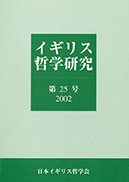As every Hume scholar knows, there are two leading interpretations concerning the fundamental position of Hume's philosophy. One views Hume the philosopher as a sceptic, and the other regards Hume's moral theory as naturalistic. And as far as Hume's moral theory is concerned, the latter interpretation is now no doubt dominant. Although by and large I would agree with the naturalistic interpretation of Hume's philosophy, I should think it necessary to clarify the meaning of “naturalism”. For, though moral naturalism tends to be identified with moral realism, I rather doubt whether we can say Hume's moral theory is a kind of moral realism. In addition to this, if moral realism, as the correspondence theory of truth maintains, should imply that a moral proposition corresponds to some state of affairs, then a problem would arise: to what state of affairs does a moral proposition correspond? This is a difficult question to anwser if we accept the dualism of fact and value.
Now some recent moral realists have introduced the idea of “supervenience” into moral theory to solve the problem. This idea, I admit, is very attractive, because it seems not only to give us the criterion to decide whether any moral proposition is true or not, but also enables us to avoid confusing moral property with natural quality. S. Blackburn, however, propounded a forceful argument that is fatal to the strategy of introducing the idea of supervenience for the solution of the problem, and contradicts moral realism.
If, however, we would accept his argument, what would be the results? In the first place, in order for us still to be justified in talking about the truth of moral propositions, we have to refuse the correspondece theory of truth and make an appeal to the coherence theory (for the pragmatic theory would not be suitable in the present situation). But, then, it may be that we are not allowed to maintain that each moral proposition does correspond to some state of affairs. In that case, to settle the matter, we have to create some logical space of reasons in which moral propositions should be located. And this means that Hume's moral theory cannot be interpreted entirely naturaristically.
I would indeed make it m y methodological rule to consider the moral matter from a naturalistic point of view as far as it is possible for us to do so, and treat moral proposition as something that can be true or false. But the rule is only a rule, so it cannot be a principle from which one can deduce anything material. Therefore, the interpretation of Hume as a naturalist can hold true, only if and as far as it would permit this circumstance. So my conclusion is rather an ironical one. The strategy of interpreting Hume's moral theory as a naturalistic one is viable, only if it argues that Hume's moral theory is in some sense not naturalistic. I defend a kind of expressivism.
View full abstract
